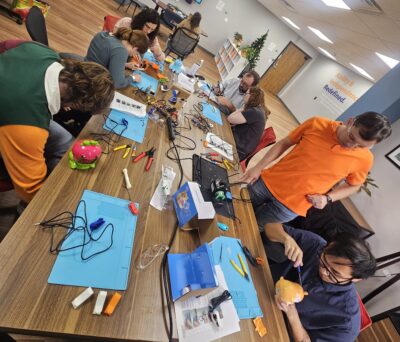A new report from one of Pittsburgh tech’s leading conveners shares optimistic data on the industry’s recent past, present and future.
Earlier this month, the Pittsburgh Technology Council published its 2021 State of the Industry Report — a compilation of regional tech industry data from 13 counties in Southwestern Pennsylvania over the last three years, produced in partnership with PricewaterhouseCoopers. Focusing on information technology, life sciences, advanced manufacturing, advanced materials, environmental technology and energy technology as the six main industry clusters, the report examines job growth, average wages and number of establishments, plus other markers of economic success.
The report found that, as of 2020, the 10,229 technology establishments located across these counties employ over 305,000 people, which makes up almost 26% of the total regional workforce. The payroll for those employees and those at related companies, like health services firms, totaled $26.5 billion annually, comprising 37% of total regional wages.
Read the reportDriving those numbers over the past three years was Pittsburgh’s growing life sciences sector (with health services included), along with the local environmental tech sector, which had payrolls that grew by nearly 23% and 14%, respectively. The information technology sector cut a close third place, with payroll growth of 11% over the three-year period.
Institutional research might be responsible for some of that success, the report found. The University of Pittsburgh spent more than $1 billion in total research and development expenditures in 2019, and ranked 15th nationally in life sciences research spending. Carnegie Mellon University, for its part, spent $360 million in research and development in 2019. Both helped to bring the region’s total research spending for that year to $1.6 billion.
More research often means more intellectual property, which opens the door to new business opportunities. In 2020, Pitt received 88 new U.S. patents while CMU gained 115, yielding large sums in licensing revenues for both schools.
Beyond industry profiles and academic research trends, the Council’s report also details investment trends in the region. Backing up the life sciences momentum seen in the wage increases were findings that capital investment deals in that sector triple from an average of six to 18, raking in the most funding of any other tech sector at $181 million total. Still, the Pittsburgh area’s most active sector for capital investment deals remained information technology and robotics. Also showing strength was manufacturing, as the second most active sector in dealmaking, hinting at the increasing need for local players there.
All of these individual data points together anchor recent successes and exits in Pittsburgh tech to real and tangible growth. Council CEO and President Audrey Russo noticed that too in her introductory letter.
“IPOs, SPACs, venture funds and angels with newfound wealth, are finally reinvesting en mass,” she wrote, alluding to recent or impending exits from companies like Duolingo and Aurora. Russo went on to say that even investors from outside the region have started coming to Pittsburgh. “Our obligation is to ensure that these companies find it easy to build and develop and test here.”
Sophie Burkholder is a 2021-2022 corps member for Report for America, an initiative of The Groundtruth Project that pairs young journalists with local newsrooms. This position is supported by the Heinz Endowments.Before you go...
Please consider supporting Technical.ly to keep our independent journalism strong. Unlike most business-focused media outlets, we don’t have a paywall. Instead, we count on your personal and organizational support.
3 ways to support our work:- Contribute to the Journalism Fund. Charitable giving ensures our information remains free and accessible for residents to discover workforce programs and entrepreneurship pathways. This includes philanthropic grants and individual tax-deductible donations from readers like you.
- Use our Preferred Partners. Our directory of vetted providers offers high-quality recommendations for services our readers need, and each referral supports our journalism.
- Use our services. If you need entrepreneurs and tech leaders to buy your services, are seeking technologists to hire or want more professionals to know about your ecosystem, Technical.ly has the biggest and most engaged audience in the mid-Atlantic. We help companies tell their stories and answer big questions to meet and serve our community.
Join our growing Slack community
Join 5,000 tech professionals and entrepreneurs in our community Slack today!

A new model for thinking about how to grow regional economies: the Innovation Ecosystem Stack

20 tech community events in October you won’t want to miss

Empowering independence for Pittsburgh’s elderly and disabled community with tech



